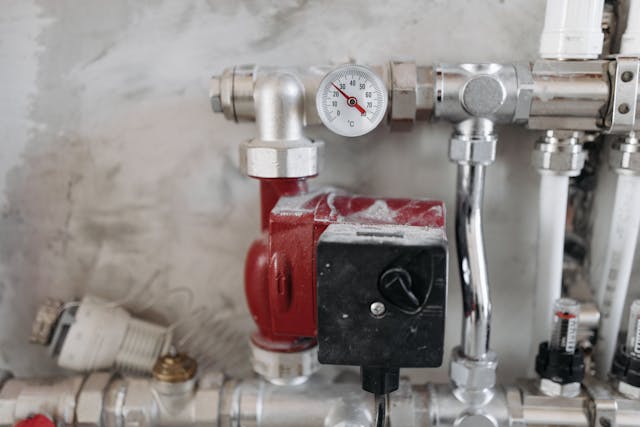HVAC systems are essential for indoor comfort, regardless of external weather conditions. Made up of various interconnected components, including heating units, cooling systems, and ductwork, HVAC systems regulate temperature and airflow within homes.
Key Benefits of Regular Inspections
Scheduling regular HVAC inspections yields multiple advantages, helping homeowners save on costs and extend the system’s longevity. The most significant benefit is the enhanced efficiency of maintaining peak system performance. When an HVAC unit operates efficiently, it reduces unnecessary energy consumption, directly impacting monthly utility bills. Moreover, conducting routine inspections with experienced technicians from a trusted Dayton HVAC company can significantly prolong the life span of an HVAC system. Noticing and dealing with minor problems quickly helps homeowners prevent expensive repairs or premature system replacement.
- Efficiency: Homeowners can maintain optimal performance by catching inefficiencies such as outdated or malfunctioning parts early, significantly reducing energy waste.
- Longevity: Regular inspections help prevent excessive wear and tear, ensuring that HVAC systems remain functional for many years.
- Improved Air Quality: Maintaining clean filters and components enhances air quality by reducing allergens and pollutants in indoor spaces.
Common Problems Identified During Inspections
Routine inspections may reveal many common issues that, if addressed, could lead to severe system malfunctions. For instance, clogged air filters can drastically reduce airflow, forcing the system to work harder and increasing energy consumption. Ductwork obstructions can limit the proper distribution of heated or cooled air, leading to uneven temperatures throughout the home. Moreover, in case of refrigerant leaks, the functioning of the air conditioner may be affected, leading to higher energy expenses and possible damage to the compressor. Spotting these issues early through professional inspections can help homeowners avoid expensive repairs and preserve a cozy living environment.
What to Expect from a Professional HVAC Inspection
Understanding Daytona’s professional HVAC inspection process allows homeowners to anticipate what will happen and promotes openness. The assessment generally starts with a first meeting, during which the technician assesses the system’s condition and addresses any problems or worries the homeowner has observed. This step provides a clear understanding of the system’s current performance. To ensure proper and safe operation, the technician inspects essential components, such as filters, coils, and electrical connections.
The last system includes conducting performance tests to verify the system’s effectiveness and compliance with safety regulations.
Frequency of Inspections
Arranging for HVAC inspections once a year is typically advised to get the most out of routine maintenance.
Inspect the cooling system in spring and the heating system in fall, corresponding with the season change. This timing readies every part for future requirements, guaranteeing smooth functionality in extreme temperatures. Regular inspection systems enable the implementation of required adjustments or preseason maintenance, which helps improve system reliability and systemization.
Do-It-Yourself Maintenance Tips
While professional inspections are essential, homeowners can adopt simple maintenance practices to support their HVAC systems between service visits. One of the most practical DIY strategies is to change air filters regularly. Filters must be changed every 1-3 months, depending on how often they are used and the surrounding environment. This method guarantees efficient air circulation and avoids putting too much strain on the system. Furthermore, keeping outdoor units clear of debris, such as leaves and branches, is essential to preserve airflow and prevent possible harm. These minor actions can significantly enhance the effectiveness and durability of HVAC systems.
The Role of Technology in HVAC Inspections
Technological advancements in the HVAC industry have revolutionized system maintenance and monitoring, making it more accessible for homeowners to ensure the proper functionality of their systems. Innovations such as smart thermostats and diagnostic tools allow real-time monitoring and control of an HVAC unit’s performance. Homeowners can now receive alerts about irregularities and quickly address issues before escalating. These advancements offer an easy method to regulate a pleasant indoor atmosphere while maximizing energy efficiency and reducing expenses.
Choosing the Right HVAC Professional
When selecting an HVAC contractor, it’s crucial to prioritize those with proper certifications and a proven reputation for reliable service. Choosing an HVAC professional should involve examining reviews and seeking references, fostering confidence that the selected expert has the necessary skills and experience. Engaging with qualified professionals guarantees high-quality inspections and assures a safe and efficient service, ultimately enhancing the performance of your HVAC system and helping it last longer.
For more insights into the importance of regular HVAC maintenance and related tips, consider exploring this comprehensive buying guide that covers diverse aspects of HVAC systems, ensuring that homeowners have all the necessary information to maintain and optimize their units effectively.




